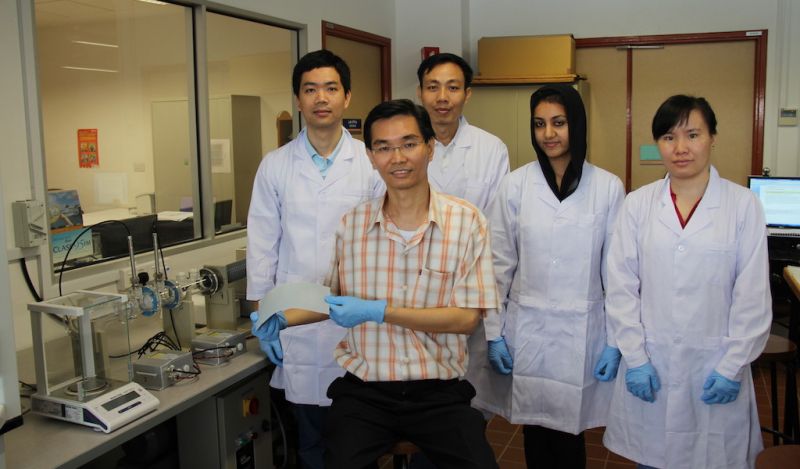Asia’s Rising Scientists: Interview with Ernest Chua
Published on by Water Network Research, Official research team of The Water Network in Social
As we grapple with the climate crisis and dwindling natural resources, it’s easy to see the parallels between The Giving Tree and our present circumstances. Though we depend greatly on nature and its many contributions, our voracious consumption has resulted in the release of alarming levels of greenhouse gases and the steady depletion of essential resources. Is it possible to ensure that man’s basic needs are met without harming the environment?
Associate Professor Ernest Chua of the National University of Singapore believes so. In 2017, he introduced his breakthrough innovation: a green air conditioner that cools without discharging large amounts of heat, using toxic chemical refrigerants or guzzling large amounts of energy. That same year, Chua also unveiled a four-in-one plant that can simultaneously produce utilities like electricity, potable water, air-conditioning and heat in an integrated, eco-friendly fashion.
In this interview, Chua shares with Asian Scientist Magazine his plans for addressing global warming and shares how he remains focused amid his relentless pursuit of solutions to some of the world’s biggest environmental problems.
How would you summarize your research in a tweet? We harvest waste heat and cold energy to generate useful utilities including steam, chilled water for air conditioning and potable drinking water.
Describe a completed research project that you are proudest of. In 2017, my team and I created the first hybrid membrane water-based air conditioner, which is capable of cooling a 100 m2 room without dissipating heat. As it uses water to remove heat from the air and membranes to remove moisture, the air-conditioner does not produce heat as a by-product. Rather, it produces cooled and dry air. This air conditioner can also double as a water harvester for tropical countries experiencing water shortages like India or Thailand.
What do you hope to accomplish with your research in the next decade? We will continue working on new material synthesis and process engineering for key applications in water, energy and environment/sustainability. We seek to address water scarcity, improve air quality and facilitate carbon capture from industrial emissions. We also hope to design and engineer our processes to be inherently scalable, so that they are deployable across households and industrial systems.
Who (or what) motivated you to go into your field of study? I wanted to realize a better world where mankind does not negatively impact the environment and basic needs like potable drinking water and thermally comfortable living conditions are met.
What is the biggest adversity that you experienced in your research? The biggest challenge is the ability to sustain excellent researchers in my team. Many times, a researcher would leave my team after three to five years of excellent research training. This is disruptive and I have to solicit new researchers and train them again.
What are the biggest challenges facing the academic research community today, and how can we fix them? Translating scientific discoveries into real world solutions is a universal goal. While supporting basic research is important, improved funding and publishing translational works are also essential to fulfil the promise of applied research. In addition, there must be sufficient time allowance to turn lab-based discoveries into tangible solutions. To address some of these issues, governments, policymakers and multi-national organizations can invest in developing new interdisciplinary research centres and supporting their activities to translational stages. There should be a known rubric for the appropriate evaluation of translational research. Other evaluating components including research sharing, patents, hardware and software developments should be considered. If you had not become a scientist, what would you have become instead? I would have become a full-time teacher. Teaching is my second love; I enjoy seeing students’ faces light up when they understand something. I am a proponent of active learning and teaching methods where basic concepts are demonstrated live to students rather than conveyed through lectures.
Associate Professor Ernest Chua (front row), holding a laboratory-synthesized membrane, with his team members. 
Outside of work, what do you do to relax? Honestly, research consumes a significant amount of my time. Any leftover time is spent with my family for simple meals and outdoor activities. Family time provides me with renewed energy to keep going. When alone, I enjoy reading biographies of great people. I also regularly make time to swim and meditate so that my body stays fit and my mind energized.
If you had the power and resources to eradicate any world problem using your research, which one would you solve? The effects of global warming are too real to ignore. For immediate impact, we need to develop technologies that reduce the emission of gaseous pollutants and exhaust heat to the environment. We hope to engineer new innovative technologies that can harvest every iota of waste energy and convert them to useful utilities. We believe this mode of ‘circular engineering’ will reduce global warming.
Read more from Asian Scientist Magazine at: https://www.asianscientist.com/2020/03/features/asias-rising-scientists-ernest-chua/
Media
Taxonomy
- Research